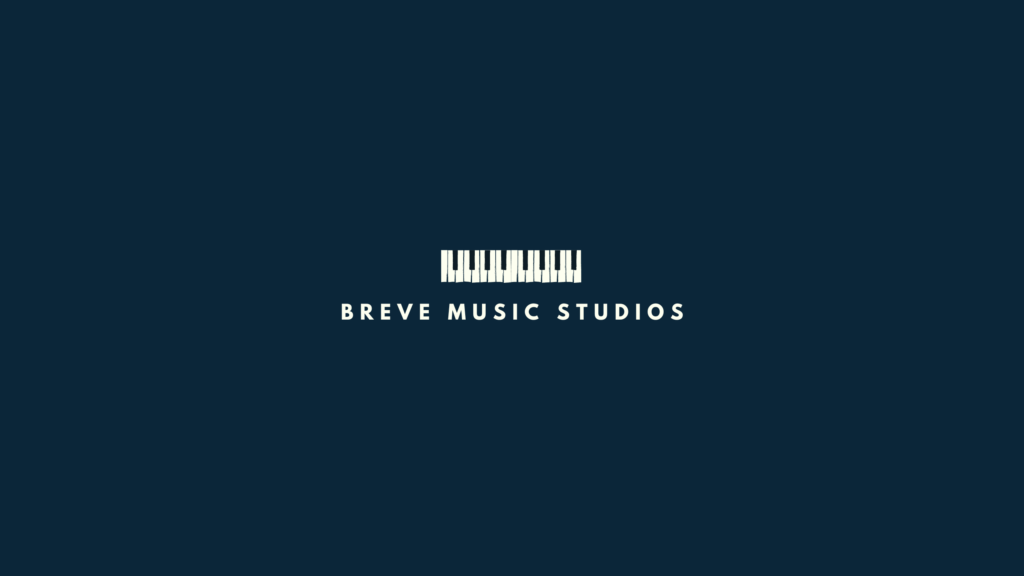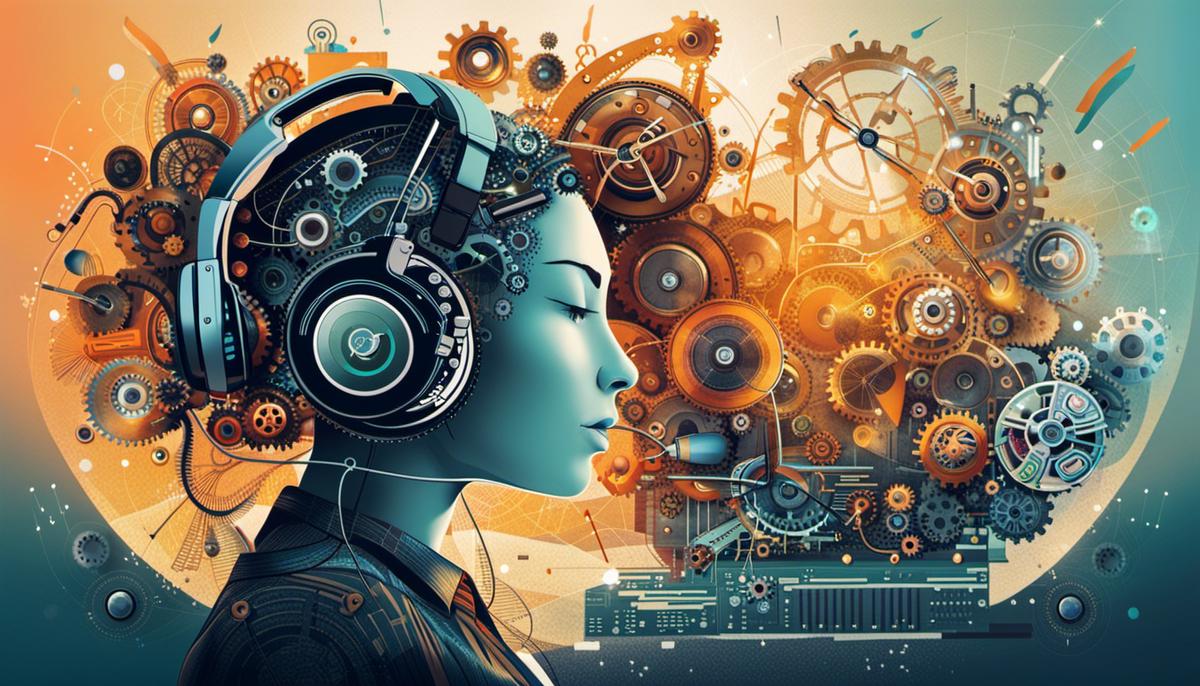Table of Contents
Introduction
The role of AI in music production has extended what is possible for artists. In this article, we discuss how artists can use artificial intelligence to when creating their music.
Understanding AI in Music Production
Understanding Artificial Intelligence
Artificial Intelligence (AI) can be seen as the simulation of human intelligence processes by machines, primarily computer systems. These processes include learning, reasoning, problem-solving, perception, and linguistic intelligence. A fundamental role of AI is its ability to rationalize and take actions that have the best chances of achieving a specific goal, even when the path to the goal is not clearly defined. AI is categorized into two types: weak or narrow AI, which is designed and trained for a particular task, and strong AI, also known as artificial general intelligence (AGI), that has generalized human cognitive abilities and can understand, learn, and apply intelligence to any intellectually-demanding task and make improvements in the process.
AI in Music
Over the past several years, artificial intelligence has increasingly found a place in the music industry. AI in music production operates on the ideas and techniques from machine learning and deep learning. It uses these mechanisms to generate music, assist composers in the process, fill gaps in performances, and even generate adaptive music, which is tailored to invoke specific emotions in a listener.
Music recommendation services like Spotify use AI to suggest songs based on a user’s listening history. AI has taken a step forward with generative capabilities, developing new compositions in the styles of existing artists or genres.
The Evolution of AI in Music Production
AI’s involvement in the music world has seen notable development since its early involvement. Initially, AI merely assisted in sorting through tracks and helping listeners discover new songs. However, it has evolved into being able to compose original scores in the styles of classical composers. For instance, AIVA (Artificial Intelligence Virtual Artist) uses deep learning networks to create tracks in the style of Beethoven, Mozart, or a new combination of styles, making it a handy tool for composers seeking inspiration or assistance.
The biggest leap in AI-assisted music production is granted by OpenAI’s MuseNet, where a deep learning model has been used to generate 4-minute musical compositions, combining up to 10 different instruments, and spanning across genres.
AI Algorithms Transforming Music Production Techniques
AI-powered algorithms are enriching the music production process, enabling producers to accomplish high levels of precision and variety without much difficulty. Advanced tools like Amper Music, HumTap, AIVA, and Jukin allow for music generation and customization in a matter of minutes.
AI algorithms can create music by learning from a database of songs, allowing them to understand various approaches to track-structure, chord-progressions, and melody-creation. Once they have learned these techniques, they can generate new music that aligns with the styles and structures found in the database.
AI also makes the mixing and mastering process easier by automatically balancing the levels of different tracks and managing the EQ and compression for the producer. These AI-powered systems can analyze a mix and suggest improvements, potentially making the role of a human producer less critical.
Despite the controversies that come with it, the incorporation of AI in music production is an incredibly fast-growing field that’s pushing boundaries. It’s changing the way we make, experience, and interpret music. As we move further into the future, AI is looking set to play a prominent role in the music industry. For music enthusiasts and producers especially, an understanding of how AI functions within this context is becoming increasingly crucial.
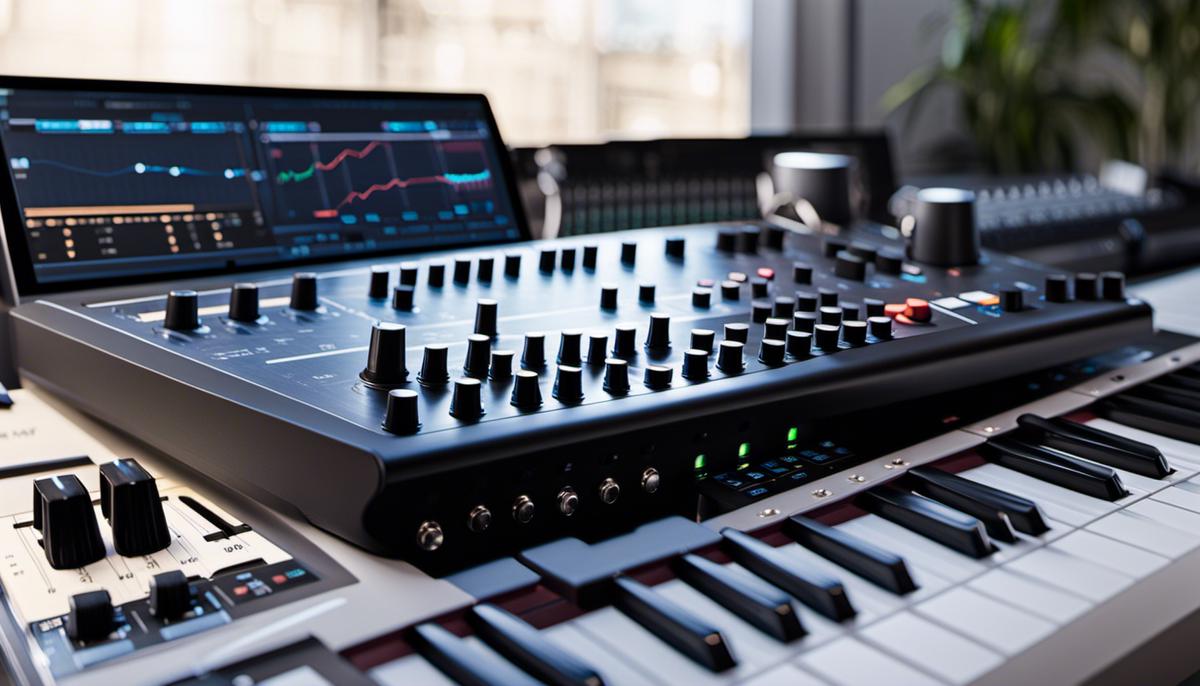
AI Tools for Music Production
Software for AI Music Composition
The role of artificial intelligence in transforming music composition cannot be overstated. We now have AI-based music composition software, such as Amper Music, OpenAI’s MuseNet, and AIVA (Artificial Intelligence Virtual Artist), that enables amateurs and hobbyists to utilize AI for creating wholly unique compositions. These AI utilities use algorithmic compositions that follow a user’s established set of musical rules and patterns. Once the AI absorbs these rules, it is capable of composing music in varied styles and moods as per these guiding principles. This amazing technology has considerably lowered the barriers to crafting authentic music, making the creation process more inclusive than ever before.
AI for Music Mixing and Mastering
AI-based tools have also made significant strides in music mixing and mastering. iZotope’s Ozone 9, for example, is equipped with Master Assistant that uses AI capabilities to analyze your mix and suggest improvements. Similarly, an AI-powered tool like LANDR offers automatic mastering services, aiding in track leveling, stereo imaging, and EQ adjustments. This has made mastering—a typically complex part of music production—more affordable and approachable for many individuals.
AI-powered Music Education Tools
Artificial Intelligence is not just revolutionizing the tangible aspects of music production like composition and mastering but is also influencing music education. Tools such as JoyTunes uses AI to create personalized music journeys tailored towards a user’s ability and progress. This can be especially beneficial for beginners learning a new instrument as it can provide real-time feedback and personalized guidance.
AI for Sound Design
AI technology extends to sound design as well, amplifying creativity through automation. Google’s Magenta project aims to empower artists by providing tools that use machine learning to create compelling art and music. A tool called ‘NSynth’ synthesizes entirely new sounds from a dataset of musical notes, enabling sound designers to create novel and unique sonic textures.
Understanding the Constraints of AI in Music Production
Despite AI’s growing influence in reshaping the music industry, it does come with its own set of challenges. Most commonly, the lack of human essence and emotional depth in AI-generated music tends to be a significant obstacle. Music created by AI often lacks the creative flair and emotional richness that human composers effortlessly imbue into their pieces. Therefore, achieving a harmonious balance between human creative instinct and the productivity offered by AI is crucial for yielding the best results.
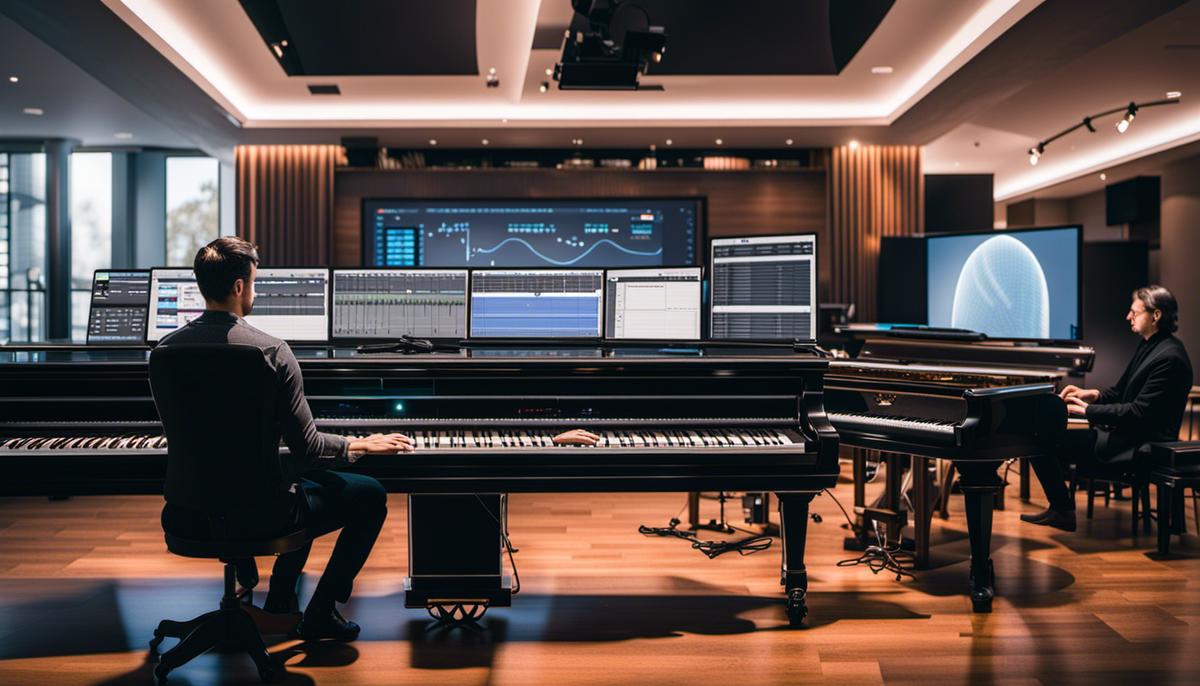
Pros and Cons of Using AI in Music Production
Benefits of Incorporating AI into Music Production
Artificial Intelligence platforms such as Amper Music, Jukin, and LANDR have triggered a revolution within the music industry, significantly minimizing the resources required to produce music. These groundbreaking tools, powered by AI, can swiftly analyze music patterns and deliver unique music tracks. This allows emerging artists and music enthusiasts to direct their energy and passion towards creativity rather than grappling with the technicalities of music production.
AI has a notable role in drastically slashing expenses related to music production. Traditional approaches to producing music usually involve pricey studio equipment and professional sound engineers to achieve the desired end product. But with AI tools replicating these functions, music production becomes more cost-effective.
Beyond that, AI in music production provides a highly customizable experience that gives composers more flexibility to match different genres and moods, immensely enhancing the quality of the production. For instance, the AI can provide data-driven advice about potential music modifications. This invaluable tool enables musicians to adjust their tracks to meet the taste and preferences of their target audience.
Potential Risks and Drawbacks with AI in Music Production
Creativity, considered the essence of music production, can be potentially compromised with the use of AI. Artificial Intelligence, despite its ability to compose music, is incapable of providing the emotional class and personal touch that human composers bring to music. This might not appeal to traditionalists who value the human element in music creation.
AI’s heavy reliance on data and patterns might also lead to homogeneity in music, thereby risking the loss of uniqueness and innovation. Since AI compositions are largely based on pre-set algorithms and the data fed to them, there’s a possibility that the resulting music might lack originality.
There are also ethical considerations associated with using AI in music production. The question of ownership and royalties becomes complex with AI-generated music — is the creator the individual operating the tool, or the creators of the AI tool themselves?
Lastly, while AI’s role in reducing production costs seems beneficial, it might lead to job losses in the industry. Sound engineers, session musicians, and others who make a living from music production could be at risk as AI technology advances and becomes more widely adopted.
Artificial Intelligence (AI) can no doubt bring multiple advantages to the world of music production, including time-saving measures, cost-effectiveness, and elevated quality levels. Nevertheless, it’s crucial to also consider the potential drawbacks that may arise from its application. These span from possible effects on creativity and originality to concerns about copyright and job protection. Hence, it’s imperative that we strike a balance in our utilization of AI in music production, ensuring human creativity remains at the center whilst still reaping the rewards AI provides.
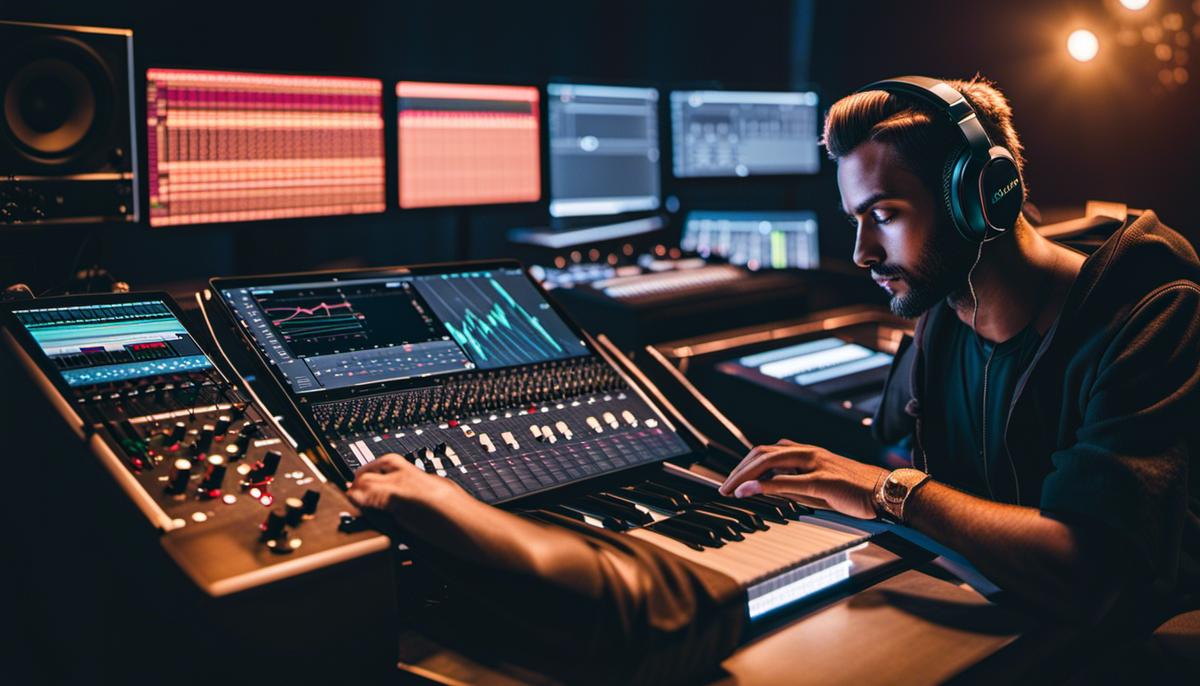
Real-life Examples and Case Studies
Delving into AIVA Technologies: A Case Study in AI and Music Composition
An illustration of practical AI implementation within music production can be seen with AIVA Technologies, the first AI system to be formally acknowledged as a composer in its own right. Utilizing AI to analyze the masterpieces of classical composers, AIVA crafts original musical pieces that mirror those structures and theoretical concepts. AIVA-generated compositions have found a place in media outlets across the globe, from advertisements and films to video games.
Using AI, AIVA composes unique musical pieces that are then adopted and modified by human musicians for various applications, including commercials, films, and video games. With AIVA providing the sheet music for human musicians to play and record, the end result is a fascinating combination of AI technology and human skill that has led to brilliant outcomes, marking the onset of a fresh perspective in music production.
Future Trend: Sony’s Flow Machines
Sony’s Flow Machines project takes a slightly different approach to AI in music production. Instead of classical music, Flow Machines uses machine learning algorithms to create pop music. The AI software learned from a database of approximately 13,000 music samples, drawing from a variety of genres and styles.
Flow Machines has already produced several tracks with the help of human composers. The tracks showcase the unique blend of computational music production and human compositional input. This project demonstrates how AI in music production can adapt to different styles and genres, indicating an emerging trend.
Noteworthy: AI-Duet From Google
Google’s AI Duet provides another noteworthy example of AI in music production. This interactive AI system generates musical responses to melodies inputted by a user, essentially creating a duet between the human and the AI.
While it may not be a traditional form of music production, AI Duet does provide a fascinating glimpse into the potential for AI in real-time collaboration and improvisation. This approach could potentially introduce new dimensions into both live performances and studio recording processes.
Top Music Producers Leveraging AI
Renowned music producers like Taryn Southern and Skygge have been known to leverage AI to enhance their production processes. Southern’s album ‘I AM AI’ was entirely composed and produced with the assistance of AI software, including Amper. The results have been hailed as both musically enjoyable and technically impressive.
Similarly, the album ‘HELLO WORLD’ by Skygge was created using Flow Machines, demonstrating how AI can contribute to diverse genres, from pop to electronic music. These cases highlight a potential future trend – that of AI becoming a common tool in the toolbox of professional music producers.
Successful AI Implementation in EDM Production
One domain where AI has seen significant success is Electronic Dance Music (EDM) production. AI algorithms have been used to create high-quality EDM tracks. Apps like Boomy utilize AI to enable users to produce listenable, unique tracks within minutes. Lickd, another platform, employs AI to provide solutions for real-time composition of original music for YouTube creators to avoid copyright issues.
Such innovations underline the potential that AI has within specialized sectors of music production, and how it could effectively democratize music creation, allowing musicians and producers to create more and focus less on the technical aspects, such as mastering and mixing.
The Intersection of AI and Music Production
Artificial Intelligence (AI) has become a groundbreaking tool in the realm of music production, bringing promise to a future where it is considered a standard inclusion in every musician’s toolkit. Innovative applications of AI have expanded the horizons of what’s possible, offering capabilities to conceive new tunes, boost production quality, cater to improvisations, and even the development of novel music genres. Furthermore, AI is shaping the future of music by democratizing the platform, allowing an increasing number of artists to partake in musical creation and re-define the industry standards.

Strategies of Incorporating AI into Music Production Workflow
Decoding AI in Music Production
In music production, artificial intelligence (AI) essentially operates through software programs designed to create, finesse, and finalize music compositions. By automating frequent and monotonous tasks, AI allows artists to allocate more energy and focus onto the creative aspects of music production. With capabilities to devise music components like melodies and drum beats, fine-tune sound frequencies during the mixing process, and play an instrumental role in mastering tracks, AI has dramatically transformed music workflows. Acquiring appropriate knowledge of diverse AI tools and utilizing them efficiently could significantly bolster your productivity and enhances the caliber of your music productions.
The Role of AI in Songwriting
AI can assist in the songwriting process through automatic generation of chord progressions, melodies, and even lyrics. Platforms such as Amper Music and AIVA can generate themes or even full compositions based on the style you select. While these tools might not completely replace a human composer, they offer a unique way of sparking creativity. By adjusting the generated compositions, you can come up with original songs in less time than composing from scratch.
Using AI for Mixing and Mastering
Mixing and mastering tracks usually involve modifying various parameters like frequency, gain, and stereo placement to balance sounds and make songs ready for release. AI software like LANDR or iZotope’s Neutron can analyze tracks and apply EQ, compression, and other audio effects automatically. While these automated mastering services might lack the personal touch of a professional human mastering engineer’s work, they provide a faster and cheaper way to get decent sounding masters for demos or independent releases.
AI in Beat Making
AI can assist in beat-making using platforms like Magenta Studio. This AI program can be used alongside traditional Digital Audio Workstations (DAW), providing pattern-generating abilities to create intricate drum sequences that might be difficult or time-consuming to program manually. You input the beat style and tempo, and the software generates several variations.
Training AI Models for Music Production
To effectively use AI in music production, you’ll have to train AI models by feeding them data, such as music genres, rhythms, chord progressions, and song structures. AI uses this data to learn patterns and create new compositions or provide assistance during the different production phases. OpenAI’s MuseNet is a good example of an AI model built using a wide range of music from various genres and epochs.
Adopting AI as a Collaborative Tool
AI should not be viewed as a replacement for human creativity but, rather, a tool to inspire and expedite creative processes. Tools like Endel.io or Humtap, for instance, work interactively with users, promoting musical ideation and sketching. They use AI to generate adaptable compositions while allowing users to influence the decision-making process.
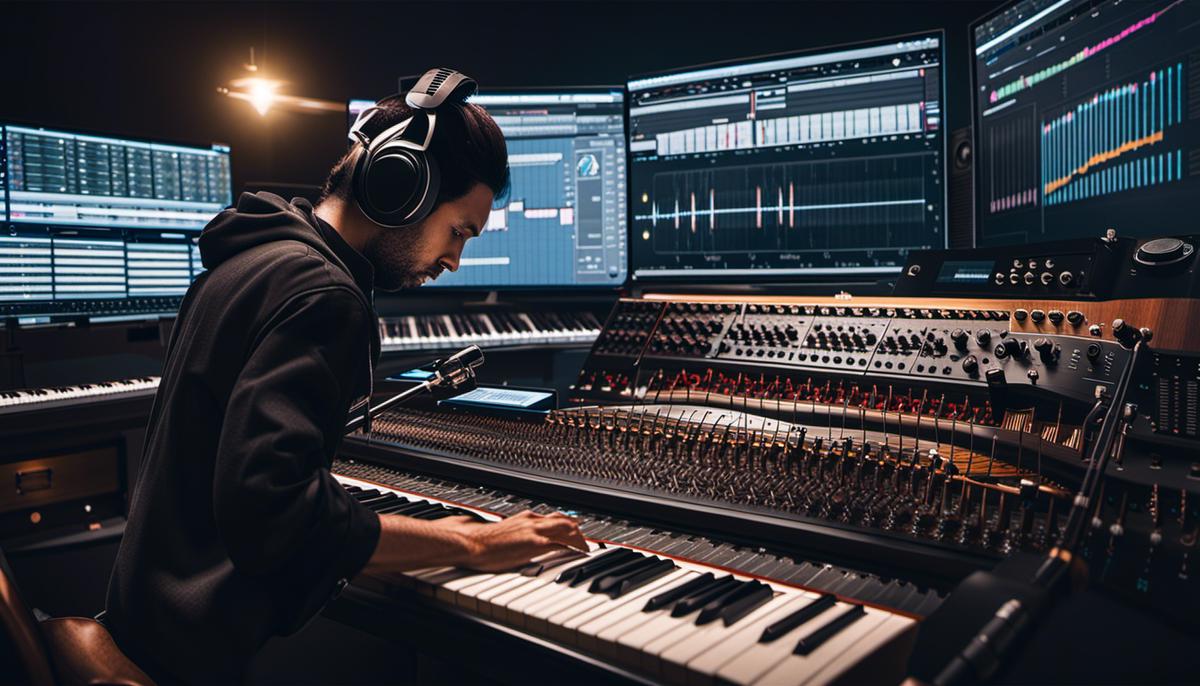
Conclusion
While the decision to incorporate AI completely into your music production process is a personal one, it’s important to understand that AI resources are tools designed to improve productivity and enhance creativity. They are not designed to entirely replace human inputs or creativity. Consider leveraging AI as a collaborative rather than a competitive tool, allowing it to take over more mundane tasks while you focus your energies on crafting an original piece of music.
Additional Reading
Take some time to check out our other articles:
- Popular Music Industry Careers
- 10 Popular Music Jobs
- 7 Essential Music Production Tools Under $100
- AI In Music Production
Breve Music Studios publishes music to Spotify, YouTube Music, Amazon Music and more. Follow our pages on Facebook, Instagram, Twitter, TikTok, and YouTube.
Listen to our ensembles: Breve Orchestra, Breve Music Ensemble, Breve Low Brass Ensemble, Breve Woodwind Ensemble, and Jermaine Harris on Spotify.
